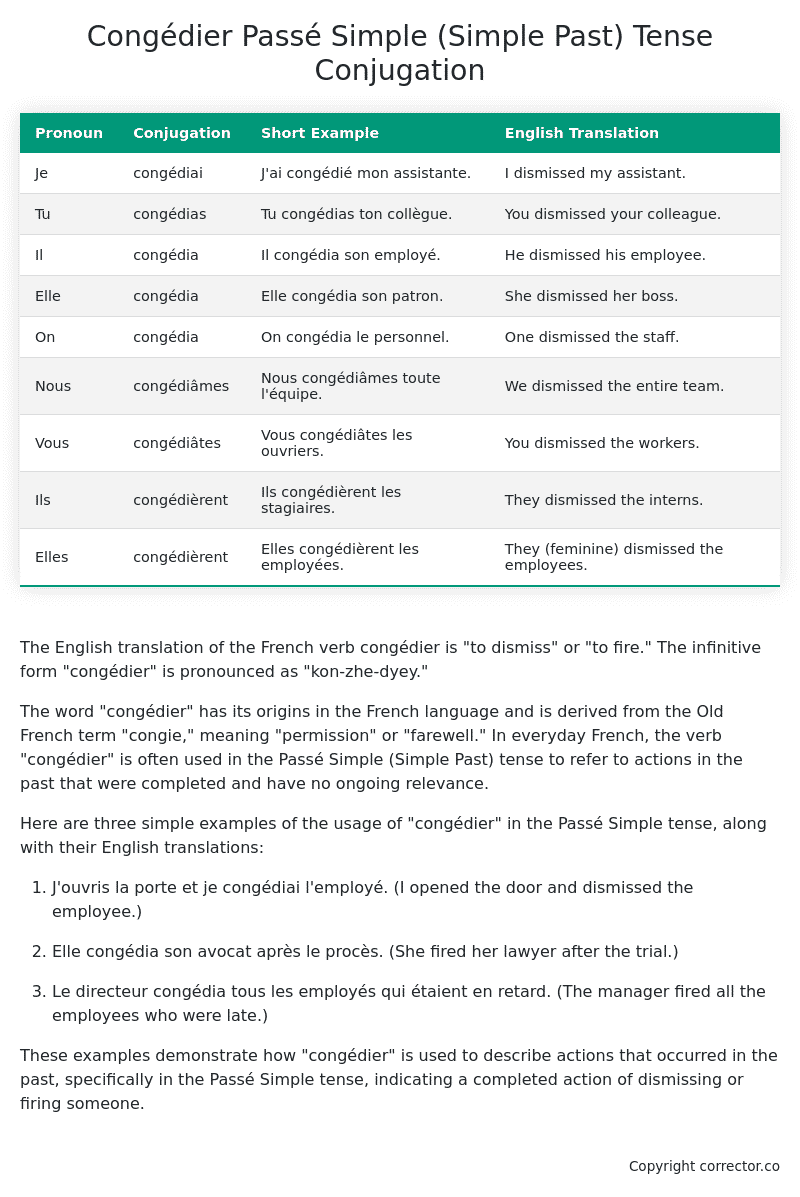Passé Simple (Simple Past) Tense Conjugation of the French Verb congédier
Introduction to the verb congédier
The English translation of the French verb congédier is “to dismiss” or “to fire.” The infinitive form “congédier” is pronounced as “kon-zhe-dyey.”
The word “congédier” has its origins in the French language and is derived from the Old French term “congie,” meaning “permission” or “farewell.” In everyday French, the verb “congédier” is often used in the Passé Simple (Simple Past) tense to refer to actions in the past that were completed and have no ongoing relevance.
Here are three simple examples of the usage of “congédier” in the Passé Simple tense, along with their English translations:
-
J’ouvris la porte et je congédiai l’employé.
(I opened the door and dismissed the employee.) -
Elle congédia son avocat après le procès.
(She fired her lawyer after the trial.) -
Le directeur congédia tous les employés qui étaient en retard.
(The manager fired all the employees who were late.)
These examples demonstrate how “congédier” is used to describe actions that occurred in the past, specifically in the Passé Simple tense, indicating a completed action of dismissing or firing someone.
Table of the Passé Simple (Simple Past) Tense Conjugation of congédier
| Pronoun | Conjugation | Short Example | English Translation |
|---|---|---|---|
| Je | congédiai | J’ai congédié mon assistante. | I dismissed my assistant. |
| Tu | congédias | Tu congédias ton collègue. | You dismissed your colleague. |
| Il | congédia | Il congédia son employé. | He dismissed his employee. |
| Elle | congédia | Elle congédia son patron. | She dismissed her boss. |
| On | congédia | On congédia le personnel. | One dismissed the staff. |
| Nous | congédiâmes | Nous congédiâmes toute l’équipe. | We dismissed the entire team. |
| Vous | congédiâtes | Vous congédiâtes les ouvriers. | You dismissed the workers. |
| Ils | congédièrent | Ils congédièrent les stagiaires. | They dismissed the interns. |
| Elles | congédièrent | Elles congédièrent les employées. | They (feminine) dismissed the employees. |
Other Conjugations for Congédier.
Le Present (Present Tense) Conjugation of the French Verb congédier
Imparfait (Imperfect) Tense Conjugation of the French Verb congédier
Passé Simple (Simple Past) Tense Conjugation of the French Verb congédier (You’re reading it right now!)
Passé Composé (Present Perfect) Tense Conjugation of the French Verb congédier
Futur Simple (Simple Future) Tense Conjugation of the French Verb congédier
Futur Proche (Near Future) Tense Conjugation of the French Verb congédier
Plus-que-parfait (Pluperfect) Tense Conjugation of the French Verb congédier
Passé Antérieur (Past Anterior) Tense Conjugation of the French Verb congédier
Futur Antérieur (Future Anterior) Tense Conjugation of the French Verb congédier
Subjonctif Présent (Subjunctive Present) Tense Conjugation of the French Verb congédier
Subjonctif Passé (Subjunctive Past) Tense Conjugation of the French Verb congédier
Subjonctif Imparfait (Subjunctive Imperfect) Tense Conjugation of the French Verb congédier
Subjonctif Plus-que-parfait (Subjunctive Pluperfect) Tense Conjugation of the French Verb congédier
Conditionnel Présent (Conditional Present) Tense Conjugation of the French Verb congédier
Conditionnel Passé (Conditional Past) Tense Conjugation of the French Verb congédier
Conditionnel Passé II (Conditional Past II) Tense Conjugation of the French Verb congédier
L’impératif Présent (Imperative Present) Tense Conjugation of the French Verb congédier
L’impératif Passé (Imperative Past) Tense Conjugation of the French Verb congédier
L’infinitif Présent (Infinitive Present) Tense Conjugation of the French Verb congédier
L’infinitif Passé (Infinitive Past) Tense Conjugation of the French Verb congédier
Le Participe Présent (Present Participle) Tense Conjugation of the French Verb congédier
Le Participe Passé (Past Participle) Tense Conjugation of the French Verb congédier
Struggling with French verbs or the language in general? Why not use our free French Grammar Checker – no registration required!
Get a FREE Download Study Sheet of this Conjugation 🔥
Simply right click the image below, click “save image” and get your free reference for the congédier Passé Simple tense conjugation!

Congédier – About the French Passé Simple (Simple Past) Tense
Formation
Usage
Narration
Historical Context
Interactions with other tenses
Passé Composé
Imparfait
Conditional and Subjunctive
Summary
I hope you enjoyed this article on the verb congédier. Still in a learning mood? Check out another TOTALLY random French verb conjugation!


